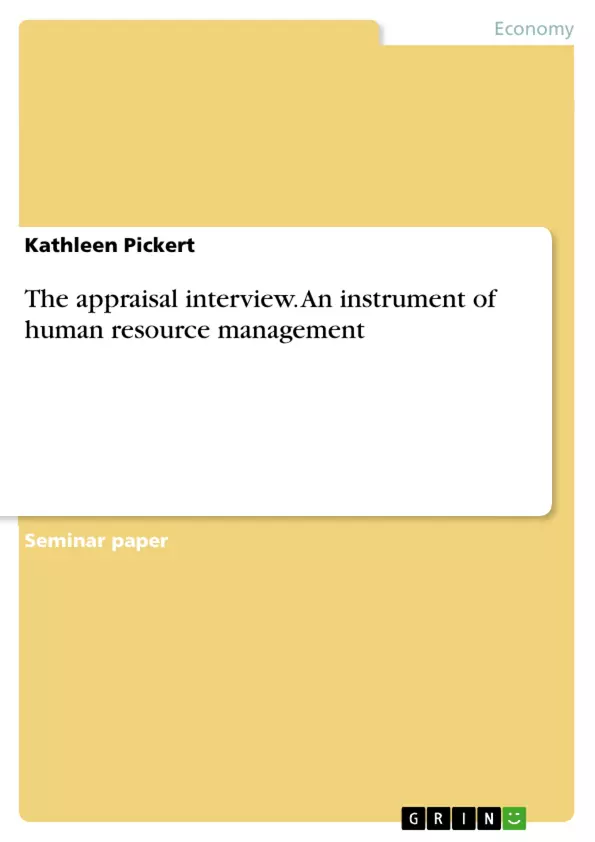This paper aims to provide an insight into the theory of appraisal interviews and interviewing techniques. The main focus of the paper will be the theoretical foundations of the appraisal interview.
At the beginning of the paper, the theoretical basis of the appraisal interview will be presented. For this purpose, the term appraisal interview will be defined in more detail and its objectives will be presented. Then, the components of the appraisal interview will be discussed. In this regard, the discussion on target agreements, the location assessment, the appraisal and development discussion, as well as the discussion on cooperation will be briefly explained. This is followed by a description of the interview process, which is divided into the rough steps of preparation, implementation and follow-up. The benefits of a qualified and committed appraisal interview are then explained.The paper concludes with a presentation of the basics of interviewing for managers. The following aspects are examined: the special situation of an appraisal interview, questioning techniques, active listening, "I" messages, feedback, praise and recognition, and criticism.
Table of Contents
- Introduction
- Motivation and goal of the work.
- Structure of the paper
- Theoretical foundations of the employee appraisal
- Classification of terms employee appraisal
- Objectives of the employee appraisal
- Components of the employee appraisal
- Exchange of target agreements.
- Review or assessment..
- Performance appraisal ………………………….
- Exchange on cooperation within the undertaking.
- Exchange on employee development and promotion .
- Procedure of the employee appraisal.
- Preparation and appointment……………...
- Implementation...
- Documentation
- Follow-up
- Benefits of the employee appraisal.……......
- Benefits for the employee
- Benefits for managers.....
- Benefits for the Organization ........
- Basics of conversation for executives.......
- The special interview situation in the employee appraisal
- Questioning technique.
- Active listening.….......
- I Messages
- Feedback...
- Praise and recognition
- Criticism
Objectives and Key Themes
This paper provides a concise overview of the theory of employee appraisals, focusing primarily on the theoretical foundations of the employee appraisal. It aims to provide an understanding of the concept, objectives, components, procedures, and benefits of employee appraisals. The paper also discusses the most basic conversational techniques used in these assessments, although it does not treat these in depth.
- Understanding the concept and various classifications of employee appraisals.
- Exploring the objectives and benefits of employee appraisals for employees, managers, and the organization.
- Analyzing the components of employee appraisals, including target agreements, performance review, and development discussions.
- Discussing the procedure of employee appraisals, encompassing preparation, implementation, documentation, and follow-up.
- Presenting the fundamentals of conversation for executives, covering topics such as questioning techniques, active listening, feedback, and criticism.
Chapter Summaries
The introduction highlights the growing importance of employee appraisals as a management tool to promote employee motivation, development, and cooperation. It outlines the paper's objective to provide a theoretical understanding of employee appraisals and their conversational techniques. The introduction also details the paper's structure, highlighting the sections dedicated to theoretical foundations, components, procedure, benefits, and conversation basics for managers.
The second chapter delves into the theoretical foundations of employee appraisals. It clarifies the concept of employee appraisals by defining their key characteristics and distinguishes between event-related and institutionalized appraisals. The chapter focuses primarily on the institutionalized employee appraisal, particularly the annual appraisal, which integrates performance assessments, employee development, promotion, and target agreements into a single discussion.
The third chapter elaborates on the objectives of employee appraisals. It emphasizes the need for clear communication of objectives to ensure satisfaction and effective conduct of these discussions. The chapter outlines the key objectives of employee appraisals, including establishing a conversation culture, improving communication and collaboration, providing feedback on strengths and weaknesses, discussing development needs, recognizing individual performance, and facilitating decision-making regarding employee assignments and responsibilities.
The fourth chapter explores the components of employee appraisals. It highlights the five essential components: exchange on target agreements, review or assessment of the situation, performance assessment, exchange about cooperation within the company, and exchange on the development and promotion of the employee. The chapter further delves into the exchange on target agreements, explaining how concrete goals for the employee are derived from the strategic organizational goals.
Keywords
The key terms and focus topics of this work include employee appraisal, performance assessment, employee development, promotion, target agreements, communication, collaboration, feedback, questioning techniques, active listening, I messages, praise, recognition, criticism, and conversation basics for executives.
Frequently Asked Questions
What is the main purpose of an appraisal interview?
The main objectives include providing performance feedback, discussing development needs, establishing a conversation culture, and aligning individual goals with company targets.
What are the five essential components of an employee appraisal?
The components are: target agreements, review of the current situation, performance assessment, cooperation within the undertaking, and employee development/promotion.
How should a manager prepare for an appraisal interview?
Preparation includes setting an appointment, gathering performance data, defining goals for the discussion, and creating a supportive environment for open communication.
What are "I" messages in communication?
"I" messages are a technique where the speaker expresses their own feelings or observations instead of blaming the listener, which helps to reduce defensiveness during feedback.
Why is active listening important for executives?
Active listening ensures that the employee feels heard and understood, which fosters trust and allows for a more productive exchange of ideas and concerns.
- Arbeit zitieren
- Kathleen Pickert (Autor:in), 2012, The appraisal interview. An instrument of human resource management, München, GRIN Verlag, https://www.grin.com/document/1169212



